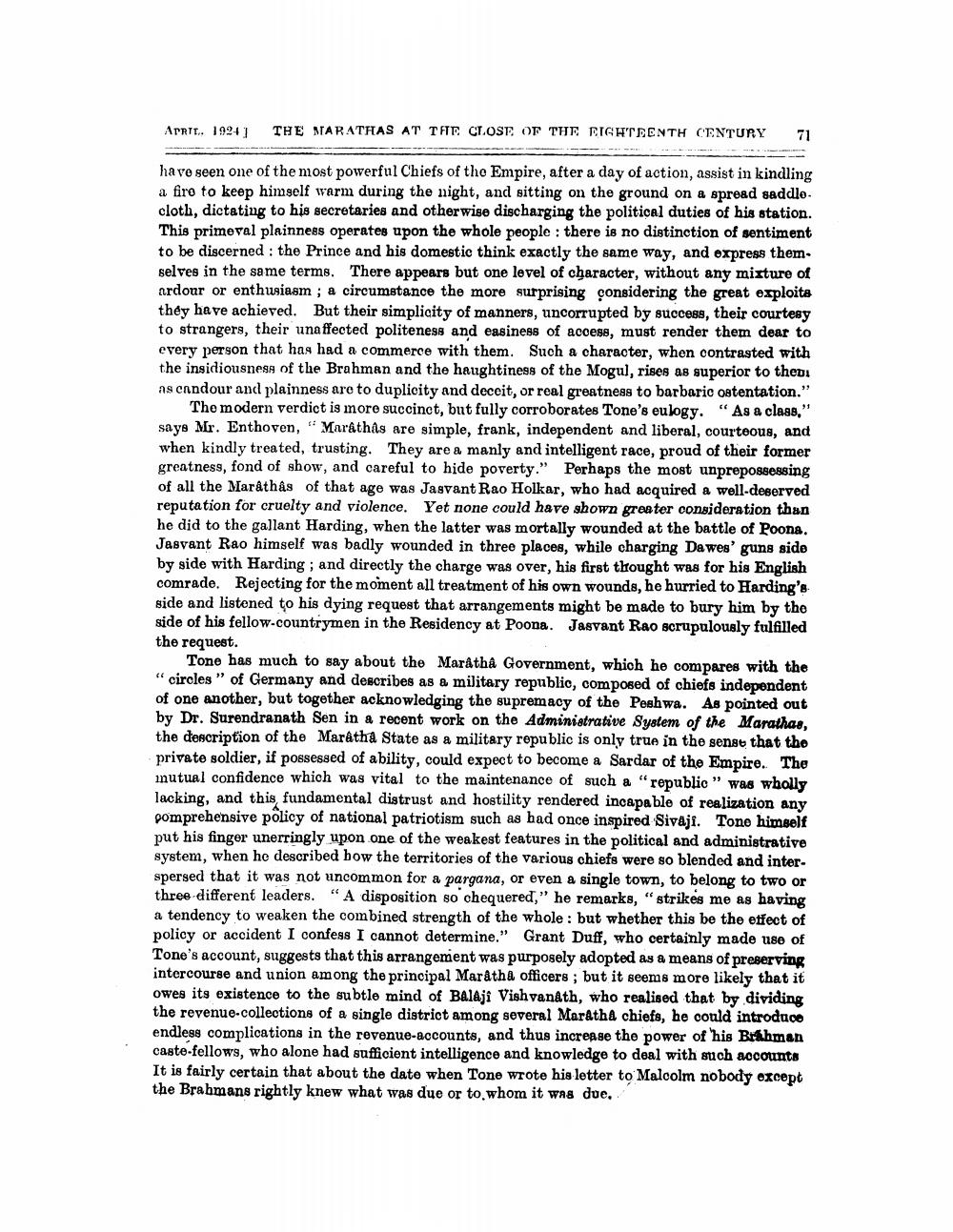________________
APRIL 1924 ]
THE MARATHAS AT THE CLOSE OF THE EIGHTEENTH CENTURY
21
have seen one of the most powerful Chiefs of the Empire, after a day of action, assist in kindling a fire to keep himself warm during the night, and sitting on the ground on a spread saddlo. cloth, dictating to his secretaries and otherwise discharging the political duties of his station. This primeval plainness operates upon the whole people : there is no distinction of sentiment to be discerned: the Prince and his domestic think exactly the same way, and express them. selves in the same terms. There appears but one level of character, without any mixture of ardour or enthusiasm ; a circumstance the more surprising considering the great exploita they have achieved. But their simplicity of manners, uncorrupted by success, their courtesy to strangers, their unaffected politeness and easiness of access, must render them dear to every person that has had a commerce with them. Such a character, when contrasted with the insidiousness of the Brahman and the haughtiness of the Mogul, rises as superior to thedi as cnndour and plainness are to duplicity and deceit, or real greatness to barbaric ostentation."
The modern verdict is more succinct, but fully corroborates Tone's eulogy. “As a class," says Mr. Enthoven, "Marathês are simple, frank, independent and liberal, courteous, and when kindly treated, trusting. They are a manly and intelligent race, proud of their former greatness, fond of show, and careful to hide poverty." Perhaps the most unprepossessing of all the Maráthâs of that age was Jagvant Rao Holkar, who had acquired a well-deserved reputation for cruelty and violence. Yet none could have shown greater consideration than he did to the gallant Harding, when the latter was mortally wounded at the battle of Poona. Jasyant Rao himself was badly wounded in three places, while charging Dawes' guns side by side with Harding; and directly the charge was over, his first thought was for his English comrade. Rejecting for the moment all treatment of his own wounds, he hurried to Harding's side and listened to his dying request that arrangements might be made to bury him by the side of his fellow-countrymen in the Residency at Poona. Jasvant Rao scrupulously fulfilled the request.
Tone has much to say about the Maratha Government, which he compared with the "circles" of Germany and describes as a military republio, composed of chiefs independent of one another, but together acknowledging the supremacy of the Peshwa. As pointed out by Dr. Surendranath Sen in a recent work on the Administrative System of the Marathas, the description of the Maratha State as a military republic is only true in the sense that the private soldier, if possessed of ability, could expect to become a Sardar of the Empire. The mutual confidence which was vital to the maintenance of such a "republic” was wholly lacking, and this fundamental distrust and hostility rendered incapable of realization any pomprehensive policy of national patriotism such as had once inspired Sivaji. Tone himself put his finger unerringly upon one of the weakest features in the political and administrative system, when he described bow the territories of the various chiefs were so blended and interspersed that it was not uncommon for a pargana, or even a single town, to belong to two or three different leaders. "A disposition so chequered," he remarks, "strikes me as having a tendency to weaken the combined strength of the whole : but whether this be the etfect of policy or accident I confess I cannot determine." Grant Duff, who certainly made use of Tone's account, suggests that this arrangement was purposely adopted as a means of preserving intercourse and union among the principal Maratha officers; but it seems more likely that it owes its existence to the subtle mind of Balaji Vishvanath, who realised that by dividing the revenue-collections of a single district among several Maratha chiefs, he could introduce endless complications in the revenue-accounts, and thus increase the power of his Bithman caste-fellows, who alone had sufficient intelligence and knowledge to deal with such accounts It is fairly certain that about the date when Tone wrote his letter to Malcolm nobody except the Brahmans rightly knew what was due or to whom it was due.




